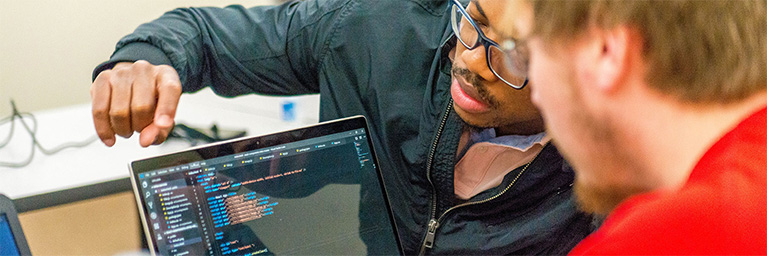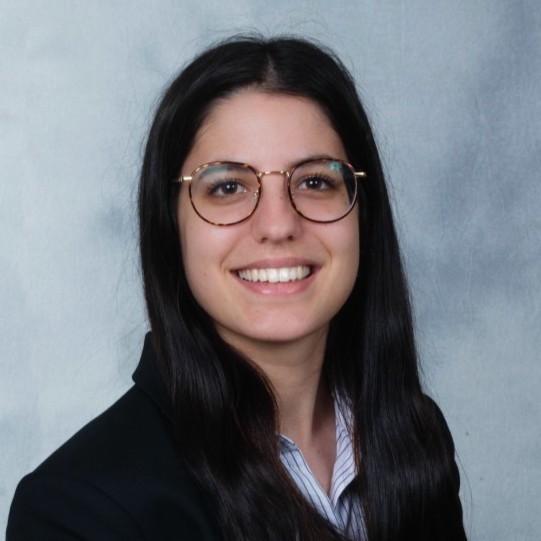
Majors
Computer Science
Bethany’s Bachelor of Arts in Computer Science delivers the knowledge and skills needed to launch a career in the financially rewarding and high-demand field of computing.
Here to Grow the Next Generation of Leaders.
Our solid liberal arts education develops communication, critical thinking, and creativity, skills valued by employers in this competitive field.
The major has been designed to fit the culture of the liberal arts while providing the rigor necessary in the computer science field. Students are encouraged to take a variety of courses from other disciplines such as Math, Media Arts, Music, Communication, and Business. This grounding in the liberal arts helps our students to be innovative problem solvers, communicators, leaders and lifelong learners in the ever-changing world of technology.
You will learn the principles of computation and algorithms and develop the essential programming and computing skills needed to step into real world computing environments.
You will work with your professors and other students to analyze problems and collaborate on solutions.
High school students and instructors are welcome to join us for special STEM events.
Computer Science News
We are in our fourth year of having a Computer Science major at Bethany and we already have many graduates! Jonny Sehloff graduated in December 2020 starting work at the University of Minnesota Athletics and currently works for ES Broadcast as a Design and Proposals Engineer. After graduation in May 2023, Nuria Perez will begin working at Anderson Windows in Minneapolis, MN after having completed an successul internship in the summer of 2022. The student population is growing as well, we currently have 6 seniors, 3 juniors, 6 sophomores and 16 freshmen who intend to major in computer science. We have students from as close as Mankato, Minnesota to Albania, China, Ethiopia, South Africa, Spain, and The Democratic Republic of the Congo.
Career Outlooks
Computing professionals are integral to virtually any enterprise’s ability to compete and succeed, the demand for well-trained graduates is very high. The Bureau of Labor Statistics projects employment of computer and information technology occupations to grow 13 percent from 2020 to 2030, faster than the average for all occupations. Demand for these workers will stem from greater emphasis on cloud computing, the collection and storage of big data, and information security. According to some estimates, as of 2023, the U.S. needs 530,000 more cybersecurity specialists to close existing supply gaps.
The median annual wage for computer science occupations was $81,578 for Minnesota and $108,913 for the United States in 2022, which was higher than the median annual wage for all occupations of $53,924. This past year, 11 of the 25 top jobs or 44% were in technology related positions according to ComputerWorld (Jan. 2023).
After graduation, you’ll be well-qualified to begin a career in industry or pursue advanced study in competitive graduate programs.
Computer Science Major Course List
Entry into the Major
A student may be admitted to the major upon completion of COMS103 Intro to Programming I and COMS104 Intro to Programming II. . Students will be granted entry into the major when they have met the following requirements:
- Achieved an overall GPA of 2.5 or higher
- Completed COMS104 Intro to Programming II a grade of “C” or better
- Secured an advisor within the computer science department
Core Requirements
Students must achieve an average GPA of 2.0 or better in the following core computer science courses:
- COMS101 Computer Applications 1 cr.
- COMS103 Intro to Programming I 3 cr.
- COMS104 Intro to Programming II 3 cr.
- COMS201 Object Oriented Programming 3 cr.
- COMS304 Computer Organization 3 cr.
- COMS320 Data Communication 3 cr.
- COMS322 Database Systems 3 cr.
- COMS326 Data Structures 3 cr.
- COMS495 Computer Science Capstone OR COMS499 Internship in Computer Science 1-4 cr.
Collateral Requirements
In addition to the core courses, the following collateral courses are required (10 credits):
Major Electives
Choose four of the following electives (12 credits). At least two must be COMS courses:
- COMS210 Internet Programming 3 cr.
- COMS324 Data Modeling 3 cr.
- COMS340 Programming Languages 3 cr.
- COMS442 Software Architecture 3 cr.
- MISY440 Project Management 3 cr.
- SCIE330 Ethics in Science 3 cr.
- SCIE350 Technology in Society 3 cr.
Electives from Other Areas
Choose two of the following electives:
- BUSN307 Business Communications and Lab 3 cr.
- COMM318 Small Group Communication 3 cr.
- GRDS332 Introduction to Web and UX Design 3 cr.
- MART295 Introduction to Broadcast Media Media 3 cr.
- MART297 Audio/Video Production 3 cr.
- MART330 Motion Graphics 3 cr.
- MART397 Advanced Audio/Video Production 3 cr.
- MUSC303 Music Communication and Technology 3 cr.
- PHIL201 Logic and Critical Thinking 3 cr.
*Completion of required courses, MATH151 Calculus I and MATH330 Discrete Mathematics positions a student for a minor in mathematics by taking MATH152 Calculus II, MATH295 Foundations of Abstract Mathematics, and (MATH243 Multivariable Calculus).
Computer Science Minor Course List
Computer Science Minor
The minor in computer science requires 21 credits distributed as follows:
Required courses (15 credits):
- COMS103 Intro to Programming I 3 cr.
- COMS104 Intro to Programming II 3 cr.
- COMS201 Object Oriented Programming 3 cr.
- COMS304 Computer Organization 3 cr.
- COMS322 Database Systems 3 cr.
Electives (at least 6 credits):
- Any 300 or 400 level COMS course or MISY440 Project Management
Jonny Sehloff
Bethany Computer Science Grad
Jonathan (Jonny) Sehloff is a 2019 Bethany computer science graduate. Sehloff took his degree and experience in Bethany’s technical broadcast studio and now designs comprehensive broadcast systems for Alpha in Eden Prairie, Minnesota.)
Computer Science Majors Work in a Variety of Areas!
- Network Architects
- Programmers
- Support Specialists
- Database Administrators
- Information Security Analysts
- Network Administrators
- Systems Analyst
- Software Developers
- Quality Assurance Analysts and Testers
- Web Developers & Digital Designers
Internships
Our students are applying for and receiving internship opportunities. The major requires either a senior project or an internship. Junior Mbuyi completed an internship with Tartan Technologies as a web developer in 2022 prior to graduation. Junior is employed by Rolls Royce Power Systems as a Web Content Editor. Gediyon Tadesse worked on an internship to help the Bethany Spirit store transition to a cloud-based software from Lightspeed that will integrate in-store sales and web sales with their inventory system. Gediyon will be attending graduate school this fall 2021 at Metro State in the Twin Cities. Nuria Perez was the recipient of our first Jenzabar funded summer internship and worked extensively with their Form Flow software developing online forms to automate paper processes. Nuria then completed an internship at Anderson Windows in the summer of 2022. Nuria used her learning experience in Databases, SQL, and Data Structures for the internships.
We also encourage students to apply for opportunities that can count for graduation credit but fall outside of the computer science major. We have had students in tech support positions and a student work for Greater Mankato Growth in a multimedia position.
Senior Profile
Nuria Perez Casas came to Bethany as an international student from Spain. Nuria decided to double major in mathematics and computer science while participating on the Bethany women’s basketball team all four years. Nuria participated in BOOM – Bethany’s Organization of Mathematics and in her senior year was Student Senate chair of Financial Affairs.
Thanks to her time and experiences in Bethany’s computer science program Nuria completed two internships while still being a student. In the summer prior to her junior year, Nuria was an intern working on Jenzabar’s software platform to convert paper forms to a digital format. Nuria wrote SQL queries and stored procedures for database communication. Nuria collaborated with various departments onsite to test the forms for accuracy and functionality.
In the summer prior to her senior year, Nuria worked at Anderson Corporation as a software engineering intern on the Supply Chain Technology Team. Nuria worked with .NET web applications that interfaced with SQL servers. Nuria gained experience with application development, requirements gathering, managing testing efforts, and creating end-user documentation.
As a small liberal arts college, Bethany provided Nuria with a well-rounded education, allowing her to be actively involved on campus while pursuing her goal of becoming a software engineer through her internships.
Here’s what she was involved with throughout her time at Bethany:
- Resident Assistant (Fall 2020 – Spring 2022)
- Bethany Lutheran College Admissions Tour Guide (Fall 2020 – Spring 2023)
- NCAA DIII Women’s Basketball (2019-2023, Team Captain 2022-2023)
- BOOM – Bethany’s Organization of Mathematics (2020-2023)
- Bethany Lutheran College Student Senate (2022-2023)
- 2022 Grace Hopper Celebration Scholarship Recipient (2022)
- ESL Adult Basic Education Volunteer (2020)
- Virtual Hackathons (2020, 2021, 2022)
- Taylor Leadership Institute
- National Society for Leadership and Success
- Scholastic Leadership Society

Take a Closer Look
In order to get a better idea of what your classes and schedule could possibly look like for this major, take a look at the Sample Academic Plan.
To view the most recent course list and requirements for the Computer Science major, please consult the Academic Catalog.
Top 10 Reasons to become a Computer Science Major
as published by the Association of Computing Machinery

1. Computing is part of everything we do!
Computing and computer technology are part of just about everything that touches our lives from the cars we drive, to the movies we watch, to the ways businesses and governments deal with us. Understanding different dimensions of computing is part of the necessary skill set for an educated person in the 21st century. Whether you want to be a scientist, develop the latest killer application, or just know what it really means when someone says “the computer made a mistake”, studying computing will provide you with valuable knowledge.
2. Expertise in computing enables you to solve complex, challenging problems.
Computing is a discipline that offers rewarding and challenging possibilities for a wide range of people regardless of their range of interests. Computing requires and develops capabilities in solving deep, multidimensional problems requiring imagination and sensitivity to a variety of concerns.
3. Computing enables you to make a positive difference in the world.
Computing drives innovation in the sciences (human genome project, AIDS vaccine research, environmental monitoring and protection just to mention a few), and also in engineering, business, entertainment and education. If you want to make a positive difference in the world, study computing.
4. Computing offers many types of lucrative careers.
Computing jobs are among the highest paid and have the highest job satisfaction. Computing is very often associated with innovation, and developments in computing tend to drive it. This, in turn, is the key to national competitiveness. The possibilities for future developments are expected to be even greater than they have been in the past.
5. Computing jobs are here to stay, regardless of where you are located.
There actually are more computing jobs than qualified people to fill them in the United States. The Bureau of Labor Statistics projects growth rates between 12% and 37% in computing and information technology occupations from 2012 through 2022. If you consider the expected growth in computing, it’s easy to see that companies simply need more talent. Don’t miss out on pursuing the large number of open positions available right now.
6. Expertise in computing helps you even if your primary career choice is something else.
Having a computing major will provide you with a foundation of knowledge, problem solving and logical thinking that will serve as a competitive advantage to you in your career, in whatever field you choose.
7. Computing offers great opportunities for true creativity and innovativeness.
Creating high-quality computing solutions is a highly creative activity, and computing supports creative work in many other fields. The best solutions in computing exhibit high levels of elegance and beauty.
8. Computing has space for both collaborative work and individual effort.
Computing is often about being part of a team that requires people with many different kinds of skills. Yet there is also plenty of space for individual flair and imagination.
9. Computing is an essential part of well-rounded academic preparation.
An increasing number of universities and employers see successful completion of a computer science course as a sign of academic well-roundedness.
10. Future opportunities in computing are without boundaries.
Computing is one of those fields where it is almost impossible to predict what will happen next. This is why we cannot even begin to imagine all the ways that you can make a contribution to it and it can make your life’s work exciting and real.
Contact the Computer Science Department
Next Steps
Interested in studying at Bethany? Scheduling a campus visit is a great way to see what we have to offer. You can meet professors or sit in on a class too! Contact our admissions office to learn more.



